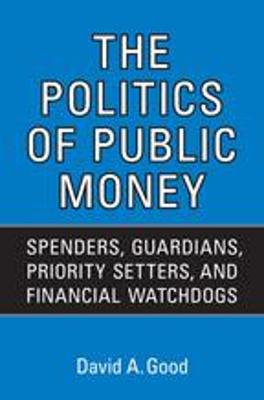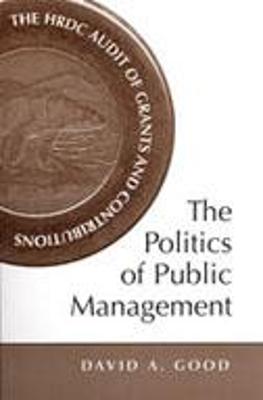IPAC Series in Public Management & Governance
2 total works
Public money is one of the primary currencies of influence for politicians and public servants. It affects the standards by which they undertake the nation's business and it impacts on the standard of living of the nation's citizens. The Politics of Public Money examines the extent to which the Canadian federal budgetary process is shifting from one based on a bilateral relationship between departmental spenders and central guardians to one based on a more complex, multilateral relationship involving a variety of players. In this innovative study, David A. Good examines this shift in terms of a broader societal change from an 'old village,' conditioned by old norms of behaviour, to a 'new town,' which brings with it new ideas about how public money should be managed and spent. Organized into four parts, the book opens with 'The Changing Politics of Public Money,' which sets out a revised and expanded framework for analysing the politics and management of public money. Part 2, 'The Public Money Players,' looks at the motivations, interdependence, and independence of the four budget players.
The third part, 'The Public Money Processes," deals with the central functions of budgeting - determining fiscal aggregates, making budget allocations, and ensuring effective financial management. Finally, 'New Prospects for Public Money,' looks ahead to the future and considers ways to strengthen the interaction among the players, and in so doing, improve the politics and management of public money. An insightful and incisive study of the changing budgetary process, The Politics of Public Money examines the promises and pitfalls of budgetary reform and sheds new light on the role insiders play in influencing government spending.
The third part, 'The Public Money Processes," deals with the central functions of budgeting - determining fiscal aggregates, making budget allocations, and ensuring effective financial management. Finally, 'New Prospects for Public Money,' looks ahead to the future and considers ways to strengthen the interaction among the players, and in so doing, improve the politics and management of public money. An insightful and incisive study of the changing budgetary process, The Politics of Public Money examines the promises and pitfalls of budgetary reform and sheds new light on the role insiders play in influencing government spending.
David Good's The Politics of Public Management is a 'textbook case' in public administration; it deals with the events and circumstances surrounding the scandal of the grants and contributions audit at Human Resources Development Canada (HRDC). More specifically, Good argues that the HRDC scandal or crisis was the result of a complex series of factors, which transformed a fixable administrative matter into media headlines alleging that the government had lost one billion dollars. The author further contextualizes this scandal by analyzing the dichotomies and contradictions inherent in public administration and supporting the larger premise that certain trade-offs must be made in the administration of any public organization. Good skillfully weaves together into a coherent and comprehensible whole both theoretical (or conceptual) and practical considerations. He draws on current scholarship throughout his analysis and captures for the reader the nuances and complexities of public administration.
The first and only extensive critical examination to date of the events surrounding the scandal at HRDC, this text offers an original and groundbreaking contribution to current scholarship on public administration and management in Canada.
The first and only extensive critical examination to date of the events surrounding the scandal at HRDC, this text offers an original and groundbreaking contribution to current scholarship on public administration and management in Canada.

